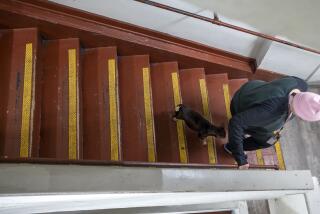High Costs Force Closing of Hospital Devoted to AIDS
- Share via
Less than a year after it was opened, the nation’s first hospital dedicated exclusively to the treatment of AIDS will be closed by its Beverly Hills owner because of losses exceeding $7 million.
The bold gamble to run a for-profit hospital to treat patients with acquired immune deficiency syndrome failed to pay off for owner American Medical International Inc. because too many poor patients sought care at the 120-bed facility, located 20 miles from downtown Houston, officials said.
“It’s too bad that what has been a medical and scientific success so far has been a financial failure making it necessary for AMI to exercise its options and phase this program out,” said Irwin H. Krakoff, chief of the division of medicine at the University of Texas M. D. Anderson Hospital.
AMI notified University of Texas System Regents that it will end the agreement to operate the Institute for Immunological Disorders with the help of doctors and researchers from the University of Texas. The 12 patients hospitalized at the institute and about 300 AIDS sufferers being cared for there as outpatients will be transferred to other health-care facilities during the next year, officials said.
“The passing of the institute will be a very big tragedy,” added Brown McDonald, executive director of the AIDS Foundation, a private, nonprofit AIDS counseling group in Houston.
The city of Houston has 1,251 AIDS cases--more than any city except New York, Los Angeles and San Francisco.
The decision to close the institute follows three months of negotiations between AMI and officials at the University of Texas System to try to preserve the innovative hospital and stem its huge financial losses.
Officials said the losses of more than $7 million in the hospital’s first 11 months of operation were caused by patients unable to pay for the expensive care. It can cost $1,200 per day to treat AIDS patients who are hospitalized and $400 per day for outpatients, officials say.
Daniel G. Moreschi, a former institute executive who first proposed that AMI establish an AIDS hospital while working for the company in 1983, said the financial problems were partly caused by private physicians who were unwilling to refer patients to the facility because they would lose medical fees. As a result, he said, mostly poor patients sought treatment at the institute.
He also said that AMI had been unwilling to mount an extensive marketing effort to overcome the stiff competition the institute faces in Houston, where there are 46 general care hospitals, including 11 operated by AMI.
AMI officials do not dispute either assessment, although privately they said marketing efforts were hurt by other unexpected expenses. One AMI official said, for example, that pharmaceutical companies were unwilling to supply free drugs for testing. As a result, the official said, AMI was forced to pay “hundreds of thousands of dollars” to purchase anti-AIDS drugs.
The institute is one of 19 AIDS treatment and evaluation facilities across the nation currently receiving federal funds to test experimental anti-AIDS drugs such as Ampligen and DHPG. It was the only one of the 19 facilities that attempted to operate on a for-profit basis.
Institute researchers were to receive federal funding through July, 1991, according to a spokeswoman for the federally run National Institute of Allergy and Infectious Diseases in suburban Washington. But spokeswoman Sandy Hecker said she did not know if the money would be cut off or shifted to other researchers in the Houston area.
Peter W. A. Mansell, the medical director of the institute, who was instrumental in soliciting the grant, was traveling in Canada on Thursday and could not be reached for comment. But Mansell told United Press International that the institute’s work would continue in some form.
“We are trying to find an alternative location,” Mansell told UPI. “AMI has done better than anyone else,” he added. “No one else has taken on this responsibility. What is the state doing to look after indigent AIDS patients? The answer is, nothing.”
More to Read
Sign up for Essential California
The most important California stories and recommendations in your inbox every morning.
You may occasionally receive promotional content from the Los Angeles Times.













